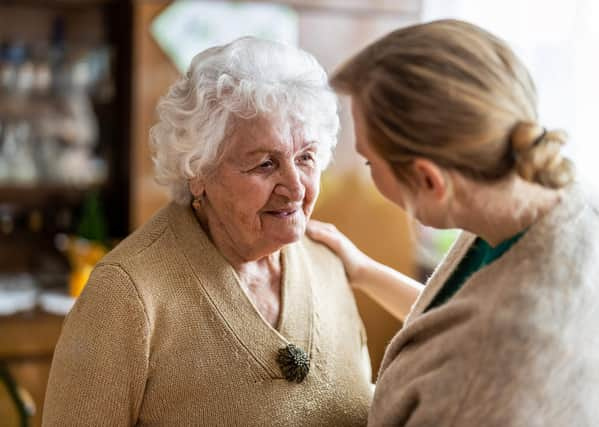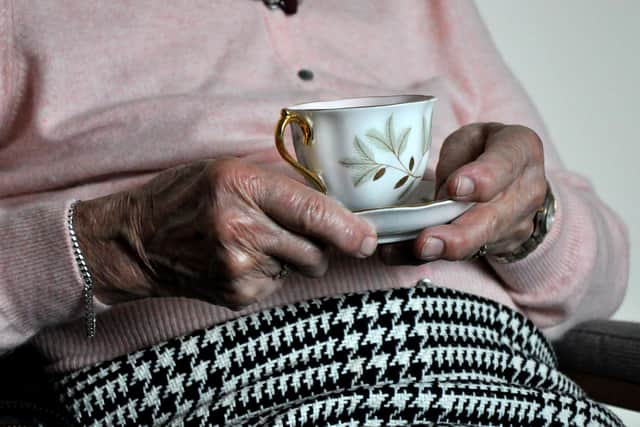How care home staffing crisis is being fuelled by post-Brexit immigration rules – Lesley Dodo


Under the UK’s new immigration rules the elderly look set to be the biggest victims of Brexit.
The staff turnover in the private care sector is currently 50 per cent a year. EU migrants make up eight per cent of the total staff in England and Wales. In some parts of England and the South East, this number is as high as 25 per cent. The industry has already had to force closures of some services due to staffing shortages.
Advertisement
Hide AdAdvertisement
Hide Ad

At the start of the pandemic, the Government shipped old people out of hospitals and into care homes. They did this to free up hospital beds without running Covid tests first. The death rate in care homes soared as a result.
It soon became clear that care home deaths were the reason behind the UK’s disastrous numbers. Only at this point was the social care sector provided with appropriate PPE.
Local authorities and private care providers are overwhelmed and understaffed. The situation looks set to worsen. On January 1, 2021, the UK’s skilled worker visa went live. Under the new rules EU migrants are only able to fill jobs that have an income threshold of £25,600 or more. They may earn less – but no less than £20,480 – as long as they have “relevant skills”.
Advertisement
Hide AdAdvertisement
Hide AdThe system would allow EU migrants to staff the NHS but not social care. Nearly 90 per cent of social care workers receive less than a real living wage. The alternative route for points if you earn £20,485 is to have a Ph.D. Unlikely in this sector.


No one can argue the devastating effect this year has had on the elderly. The unfair and cruel treatment feels more like contemptuous disdain rather than callous disregard.
Priti Patel has made it her personal mission to reduce immigration numbers by any means necessary. The ban on these workers is in direct opposition to the economy’s need for social care staffing.
Under the new rules, UK labour costs will rise and services that rely on migrant workers from hospitality to health will buckle under the strain.
Advertisement
Hide AdAdvertisement
Hide AdBut lack of staff isn’t the only worry for the elderly. In the wake of a no-deal Brexit, the country could suffer both food and medicine shortages. The impact on this age group would be devastating. Death rates will continue to rise.
Despite this, the Government refuses to budge on the Health and Care visa. It claims immigration is not the answer to solving the problems faced by the industry.
It is true immigration alone may not be enough to solve staffing issues faced by the social care sector. Long term solutions will need investment, regulation and reform. Pay rises will be vital to aid in slowing staff turnover.
There is no doubt that increasing pay will help with domestic recruitment. But it would also allow EU migrants to qualify under new visa rules. The choice between domestic and international recruitment is not binary.
Advertisement
Hide AdAdvertisement
Hide AdThe crisis facing social care doesn’t look set to see a resolution anytime soon. Both local authorities and private health care providers are already working hand to mouth and stretched to breaking point. Years of budget cuts to the adult care sector mean a pay rise is unlikely. In the wake of Covid 19, one in 10 care homes face closure. If I was Matt Hancock, I’d cry too.
But perhaps the biggest worry of all is this. In the face of a national care staffing crisis and a no-deal Brexit looming, the risk of food and medicine shortages does not seem high on the agenda at Downing Street. Instead, politicians are hard at work discussing the nutritional value of a scotch egg.
You could be mistaken for thinking the Tories are attempting to cull the elderly. A tweet by Jeremy Hunt, a former Health and Social Care Secretary and the current chair of Parliament’s Health Committee, recently read: “Every older person should die with dignity and respect. We should be the party who sorts it out.”
The words “with dignity and respect” now feel somewhat misplaced.
Lesley Dodo is a content writer for ImmigrationNews.co.uk.
Advertisement
Hide AdAdvertisement
Hide AdSupport The Yorkshire Post and become a subscriber today. Your subscription will help us to continue to bring quality news to the people of Yorkshire. In return, you’ll see fewer ads on site, get free access to our app and receive exclusive members-only offers. Click here to subscribe.
Comment Guidelines
National World encourages reader discussion on our stories. User feedback, insights and back-and-forth exchanges add a rich layer of context to reporting. Please review our Community Guidelines before commenting.